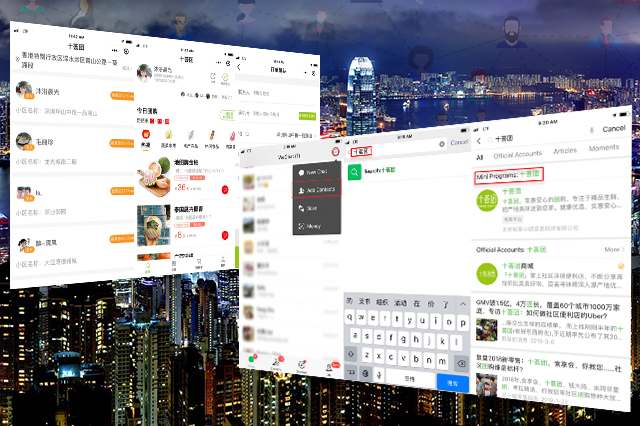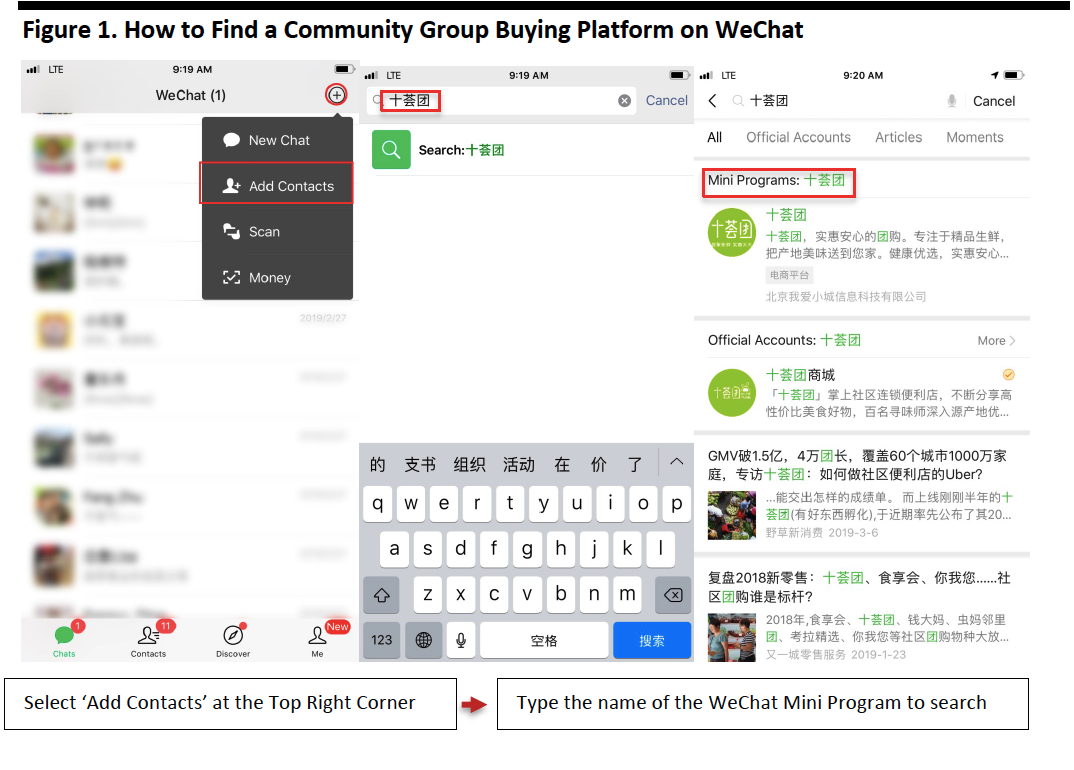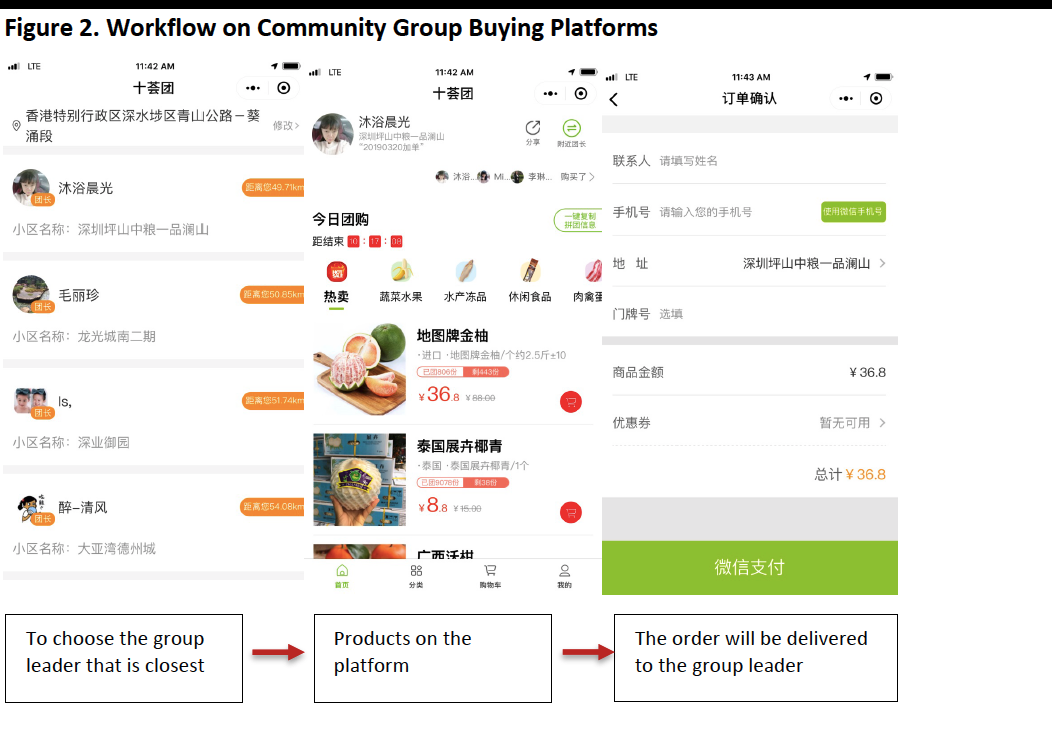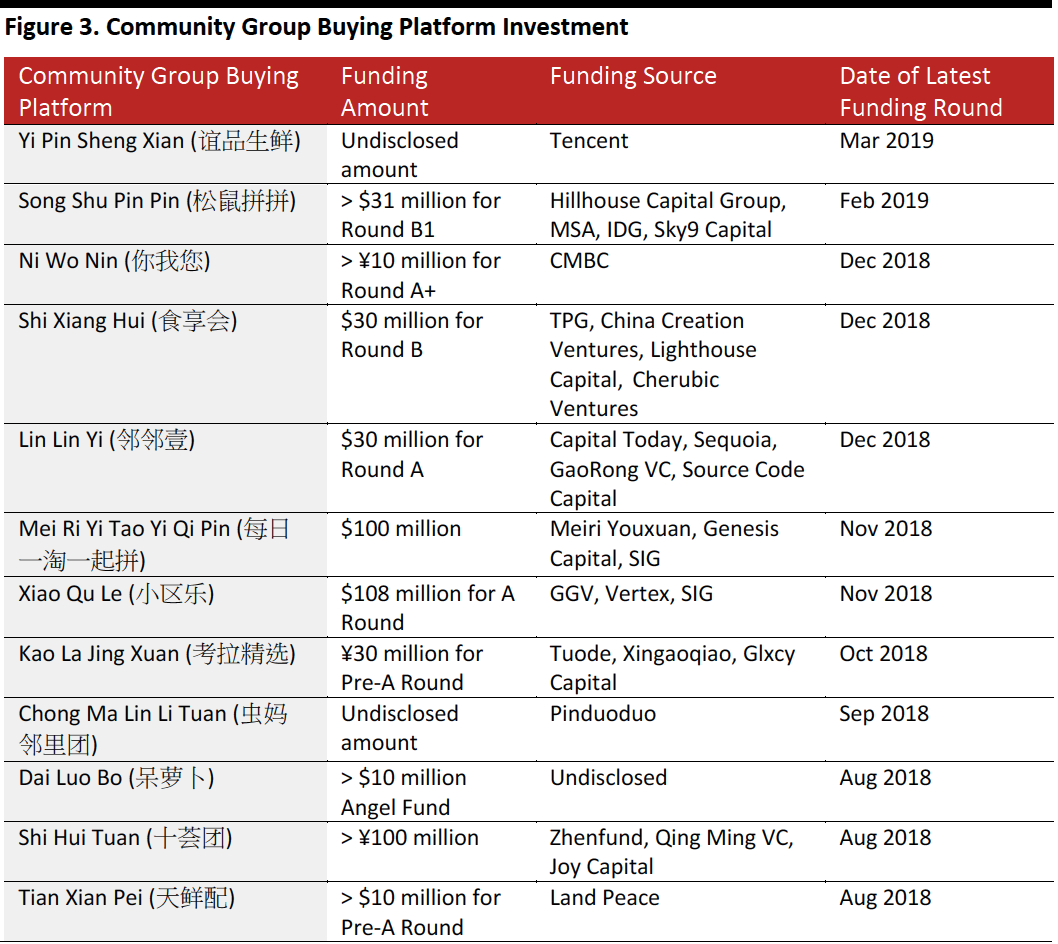
Nitheesh NH
Community group buying is a new approach of selling to people living in close proximity that seeks to tap into demand from groups of people buying in bulk, introduced by various community group buying companies and operating on WeChat’s platform.
With China’s rapid urbanization, we believe community group buying will grow, as daily living needs for community residents continue to rise along with rising incomes, and as people continue to move from the countryside to more densely populated urban areas. According to the Development Research Center of the State Council of China, 66% of China’s population will live in the city by 2030. An estimated 12 million people will move into cities every year in the future, and these internal migrants will form about 20,000 new communities.
What Is Community Group Buying?
Community group buying refers to an e-commerce model of group purchases by residents within the same neighborhood, using WeChat mini programs. This is how it works:
 Source: WeChat/Coresight Research[/caption]
When users join a buying group, they can pick the group leader they want — usually a friend or the group leader who lives in the closest neighborhood. The resident can also apply to be a group buying leader. The leader plays a significant role in promoting products in WeChat group or his/her WeChat moments (i.e., a Facebook-style news feed). After joining a buying group, the resident can see a list of products, such as fresh produce and groceries, click into the leader’s page, and place orders. The products will then be delivered from vendors to the group leader who then delivers to the end customer.
[caption id="attachment_82470" align="aligncenter" width="640"]
Source: WeChat/Coresight Research[/caption]
When users join a buying group, they can pick the group leader they want — usually a friend or the group leader who lives in the closest neighborhood. The resident can also apply to be a group buying leader. The leader plays a significant role in promoting products in WeChat group or his/her WeChat moments (i.e., a Facebook-style news feed). After joining a buying group, the resident can see a list of products, such as fresh produce and groceries, click into the leader’s page, and place orders. The products will then be delivered from vendors to the group leader who then delivers to the end customer.
[caption id="attachment_82470" align="aligncenter" width="640"] Source: WeChat/Coresight Research[/caption]
What Products Do Community Group Buying Platform Offer?
Group buying platforms generally offer groceries and consumables that are in constant demand, such as fruits, vegetables, seafood, meat, and everyday products such as household consumables, cooking oil, seasonal clothes and cosmetics. These products are offered partly because of convenience and lower prices these platforms can offer. A resident in the community can conveniently receive these daily consumables from group buying leaders who live in the same neighbourhood. On the other hand, community group buying leverages direct sourcing from the vendors, which helps keep prices low and enhances freshness and quality of products. As everyday staples, the demand for these products is huge, online as well as offline: the Chinese fresh-food e-commerce market is expected to reach ¥256.5 billion (around $38.3 billion) in 2019, according to consulting firm iResearch.
Why Choose Community Group Buying?
Group buying offers more competitive pricing as vendors can deliver larger volumes of product directly to the one person (the community leader) instead of delivering smaller quantities to a larger number of customers.
When a buying leader creates a new WeChat group, he or she will recommend specific products. Group buying leaders understand the community’s needs better – as they live in it.
Leaders also interact with customers and deal with questions.
Group buying also eases logistics pain points in lower-tier cities that generally have lower per capita spending rates than higher-tier cities and Hema Supermarket and JD Supermarket offer not as fast delivery service as in higher-tier cities. Some 60% of community group buying platform customers are from lower-tier cities, according to data from QuestMobile, a business intelligence company.
The Community Leader Acts as An Agent
Many community leaders are mom-and-pop store owners or stay-at-home mothers.
Source: WeChat/Coresight Research[/caption]
What Products Do Community Group Buying Platform Offer?
Group buying platforms generally offer groceries and consumables that are in constant demand, such as fruits, vegetables, seafood, meat, and everyday products such as household consumables, cooking oil, seasonal clothes and cosmetics. These products are offered partly because of convenience and lower prices these platforms can offer. A resident in the community can conveniently receive these daily consumables from group buying leaders who live in the same neighbourhood. On the other hand, community group buying leverages direct sourcing from the vendors, which helps keep prices low and enhances freshness and quality of products. As everyday staples, the demand for these products is huge, online as well as offline: the Chinese fresh-food e-commerce market is expected to reach ¥256.5 billion (around $38.3 billion) in 2019, according to consulting firm iResearch.
Why Choose Community Group Buying?
Group buying offers more competitive pricing as vendors can deliver larger volumes of product directly to the one person (the community leader) instead of delivering smaller quantities to a larger number of customers.
When a buying leader creates a new WeChat group, he or she will recommend specific products. Group buying leaders understand the community’s needs better – as they live in it.
Leaders also interact with customers and deal with questions.
Group buying also eases logistics pain points in lower-tier cities that generally have lower per capita spending rates than higher-tier cities and Hema Supermarket and JD Supermarket offer not as fast delivery service as in higher-tier cities. Some 60% of community group buying platform customers are from lower-tier cities, according to data from QuestMobile, a business intelligence company.
The Community Leader Acts as An Agent
Many community leaders are mom-and-pop store owners or stay-at-home mothers.
 Source: Huxiu/36Kr[/caption]
Key Insights
The community group buying model enabled by WeChat lets neighbors buy together through a “leader” – often mom-and-pop store owners or stay-at-home mothers. These platforms can serve markets in lower-tier cities, benefiting consumers through lower prices and merchants with more cost-effective reach into communities of customers.
Source: Huxiu/36Kr[/caption]
Key Insights
The community group buying model enabled by WeChat lets neighbors buy together through a “leader” – often mom-and-pop store owners or stay-at-home mothers. These platforms can serve markets in lower-tier cities, benefiting consumers through lower prices and merchants with more cost-effective reach into communities of customers.
- Community group buying platforms on WeChat source directly from vendors of products such as farm produce and daily consumables.
- Consumers living in close proximity to one another can join and buy products in bulk at lower cost.
- One person acts as a “leader,” serving as agent between the community group buying platform and other consumers.
 Source: WeChat/Coresight Research[/caption]
When users join a buying group, they can pick the group leader they want — usually a friend or the group leader who lives in the closest neighborhood. The resident can also apply to be a group buying leader. The leader plays a significant role in promoting products in WeChat group or his/her WeChat moments (i.e., a Facebook-style news feed). After joining a buying group, the resident can see a list of products, such as fresh produce and groceries, click into the leader’s page, and place orders. The products will then be delivered from vendors to the group leader who then delivers to the end customer.
[caption id="attachment_82470" align="aligncenter" width="640"]
Source: WeChat/Coresight Research[/caption]
When users join a buying group, they can pick the group leader they want — usually a friend or the group leader who lives in the closest neighborhood. The resident can also apply to be a group buying leader. The leader plays a significant role in promoting products in WeChat group or his/her WeChat moments (i.e., a Facebook-style news feed). After joining a buying group, the resident can see a list of products, such as fresh produce and groceries, click into the leader’s page, and place orders. The products will then be delivered from vendors to the group leader who then delivers to the end customer.
[caption id="attachment_82470" align="aligncenter" width="640"] Source: WeChat/Coresight Research[/caption]
What Products Do Community Group Buying Platform Offer?
Group buying platforms generally offer groceries and consumables that are in constant demand, such as fruits, vegetables, seafood, meat, and everyday products such as household consumables, cooking oil, seasonal clothes and cosmetics. These products are offered partly because of convenience and lower prices these platforms can offer. A resident in the community can conveniently receive these daily consumables from group buying leaders who live in the same neighbourhood. On the other hand, community group buying leverages direct sourcing from the vendors, which helps keep prices low and enhances freshness and quality of products. As everyday staples, the demand for these products is huge, online as well as offline: the Chinese fresh-food e-commerce market is expected to reach ¥256.5 billion (around $38.3 billion) in 2019, according to consulting firm iResearch.
Why Choose Community Group Buying?
Group buying offers more competitive pricing as vendors can deliver larger volumes of product directly to the one person (the community leader) instead of delivering smaller quantities to a larger number of customers.
When a buying leader creates a new WeChat group, he or she will recommend specific products. Group buying leaders understand the community’s needs better – as they live in it.
Leaders also interact with customers and deal with questions.
Group buying also eases logistics pain points in lower-tier cities that generally have lower per capita spending rates than higher-tier cities and Hema Supermarket and JD Supermarket offer not as fast delivery service as in higher-tier cities. Some 60% of community group buying platform customers are from lower-tier cities, according to data from QuestMobile, a business intelligence company.
The Community Leader Acts as An Agent
Many community leaders are mom-and-pop store owners or stay-at-home mothers.
Source: WeChat/Coresight Research[/caption]
What Products Do Community Group Buying Platform Offer?
Group buying platforms generally offer groceries and consumables that are in constant demand, such as fruits, vegetables, seafood, meat, and everyday products such as household consumables, cooking oil, seasonal clothes and cosmetics. These products are offered partly because of convenience and lower prices these platforms can offer. A resident in the community can conveniently receive these daily consumables from group buying leaders who live in the same neighbourhood. On the other hand, community group buying leverages direct sourcing from the vendors, which helps keep prices low and enhances freshness and quality of products. As everyday staples, the demand for these products is huge, online as well as offline: the Chinese fresh-food e-commerce market is expected to reach ¥256.5 billion (around $38.3 billion) in 2019, according to consulting firm iResearch.
Why Choose Community Group Buying?
Group buying offers more competitive pricing as vendors can deliver larger volumes of product directly to the one person (the community leader) instead of delivering smaller quantities to a larger number of customers.
When a buying leader creates a new WeChat group, he or she will recommend specific products. Group buying leaders understand the community’s needs better – as they live in it.
Leaders also interact with customers and deal with questions.
Group buying also eases logistics pain points in lower-tier cities that generally have lower per capita spending rates than higher-tier cities and Hema Supermarket and JD Supermarket offer not as fast delivery service as in higher-tier cities. Some 60% of community group buying platform customers are from lower-tier cities, according to data from QuestMobile, a business intelligence company.
The Community Leader Acts as An Agent
Many community leaders are mom-and-pop store owners or stay-at-home mothers.
- Mom-and-pop shops can leverage their existing customer base to sell more products, using their shop or home as a pick up location – turning the WeChat community group into an online to offline enabler for small shops. This community group buying model gives mom-and-pop shops access to some of the online buying and selling power normally available only to big companies. Leveraging mom-and-pop shops’ great proximity to customers who live in the same neighbourhood.
- Stay-at-home mothers can promote products to friends and neighbors.
- Employed: The community leader is employed by the platform, and receives a salary plus commission.
- Cooperation: The community leader receives commission only.
 Source: Huxiu/36Kr[/caption]
Key Insights
The community group buying model enabled by WeChat lets neighbors buy together through a “leader” – often mom-and-pop store owners or stay-at-home mothers. These platforms can serve markets in lower-tier cities, benefiting consumers through lower prices and merchants with more cost-effective reach into communities of customers.
Source: Huxiu/36Kr[/caption]
Key Insights
The community group buying model enabled by WeChat lets neighbors buy together through a “leader” – often mom-and-pop store owners or stay-at-home mothers. These platforms can serve markets in lower-tier cities, benefiting consumers through lower prices and merchants with more cost-effective reach into communities of customers.